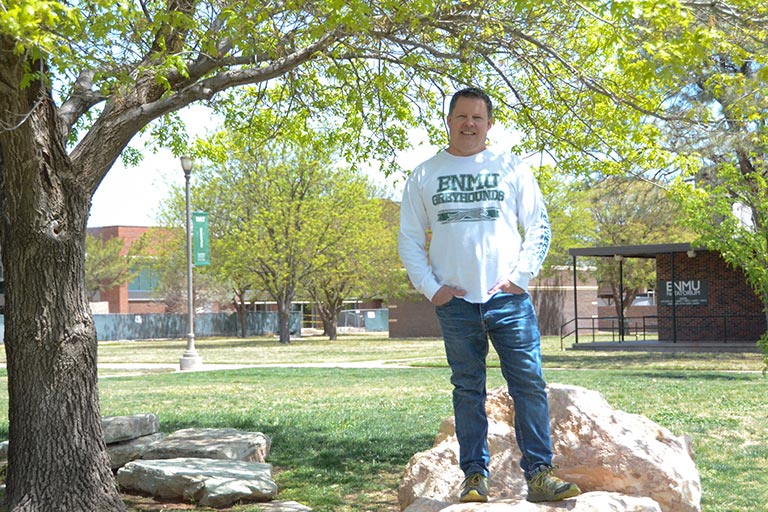Gregory "Greg" Code, a graduate student studying communicative disorders at Eastern New Mexico University, was born and raised in Los Angeles, California. He earned his Bachelor of Arts in Communication from California State University: Northridge and used his degree to work as a camera operator, shooting music videos and getting the opportunity to meet quite a few celebrities.
He moved to Portland, Oregon, and began working as a real estate agent. He decided to change his career path after finding that the "market wasn't doing that well and I started to dread going to the office."
Greg wanted to work as a special education teacher, but after further investigation and conversations with his cousin, who was a special education teacher, he decided that speech pathology was better suited for him.
He enrolled in a post-baccalaureate program at Portland State University. The field of speech pathology requires a master's degree and the passing of the Praxis exam to practice, so Greg embarked on the next chapter of his journey: attending graduate school.
"I choose ENMU for two reasons. The first reason was that the CDIS program had spring admissions. I felt my chances of getting into a program were much greater for the spring term," he explained. "The second reason was I could do distance learning and had the option of returning to Portland. I ended up staying here [in Portales] because I felt I would do better attending classes on campus."
Greg dropped from full-time to part-time to get as much from the program as possible, which is an excellent feature this program offers. He said the "entire CDIS faculty have guided me in some way through this process."
Greg's advice for students interested in pursuing a graduate degree in CDIS is "don't overload yourself. Don't worry about getting A's in everything. Certainly try, but take the pressure off and enjoy the learning process. It's okay to cut back your class load if it is affecting your performance. It's not a race, and not everyone is set up to get it done in two and a half years."
For those considering speech-language pathology, he recommends finding "professional speech-language pathologists in different settings that would be willing to be shadowed and go and see what they do and how they interact with other professionals. It might be good to take an undergrad class or two and see if it is something you are truly passionate about."
Greg, who plans to graduate in spring 2019, recently presented his research at the ENMU Student Research and Creativity Conference. "I chose my research question 'Do temperament and personality types play a factor in the ratio of men to women in the field of speech-language pathology?' because there are only 2.8 percent males in this profession and I wanted to know if personality and temperament were factors.
"My ultimate goal is to be an advocate for increasing the male population in this profession. My research might help our national organization, the American Speech and Hearing Association (ASHA), figure out ways to market to appropriate male populations and encourage them to enter into the field of speech-language pathology."
Ultimately Greg is interested in the cognitive aspect of the field and hopes to work with patients with traumatic brain injuries or post-stroke in the hospital setting or a skilled nursing facility.
"I don't have children, so I hope my legacy will be to change the career of speech pathology for the better. I want to help as many people as I can," he said.



